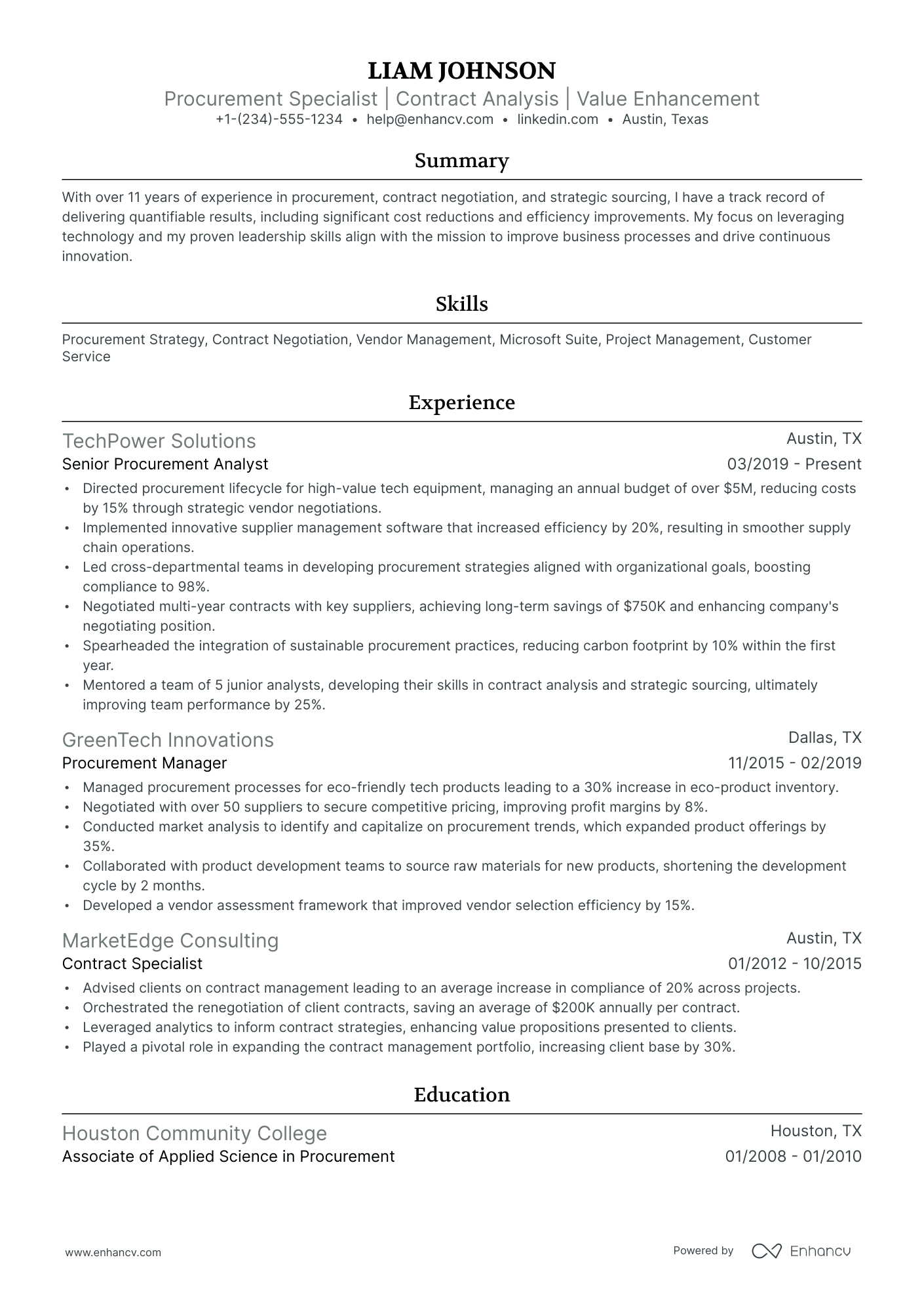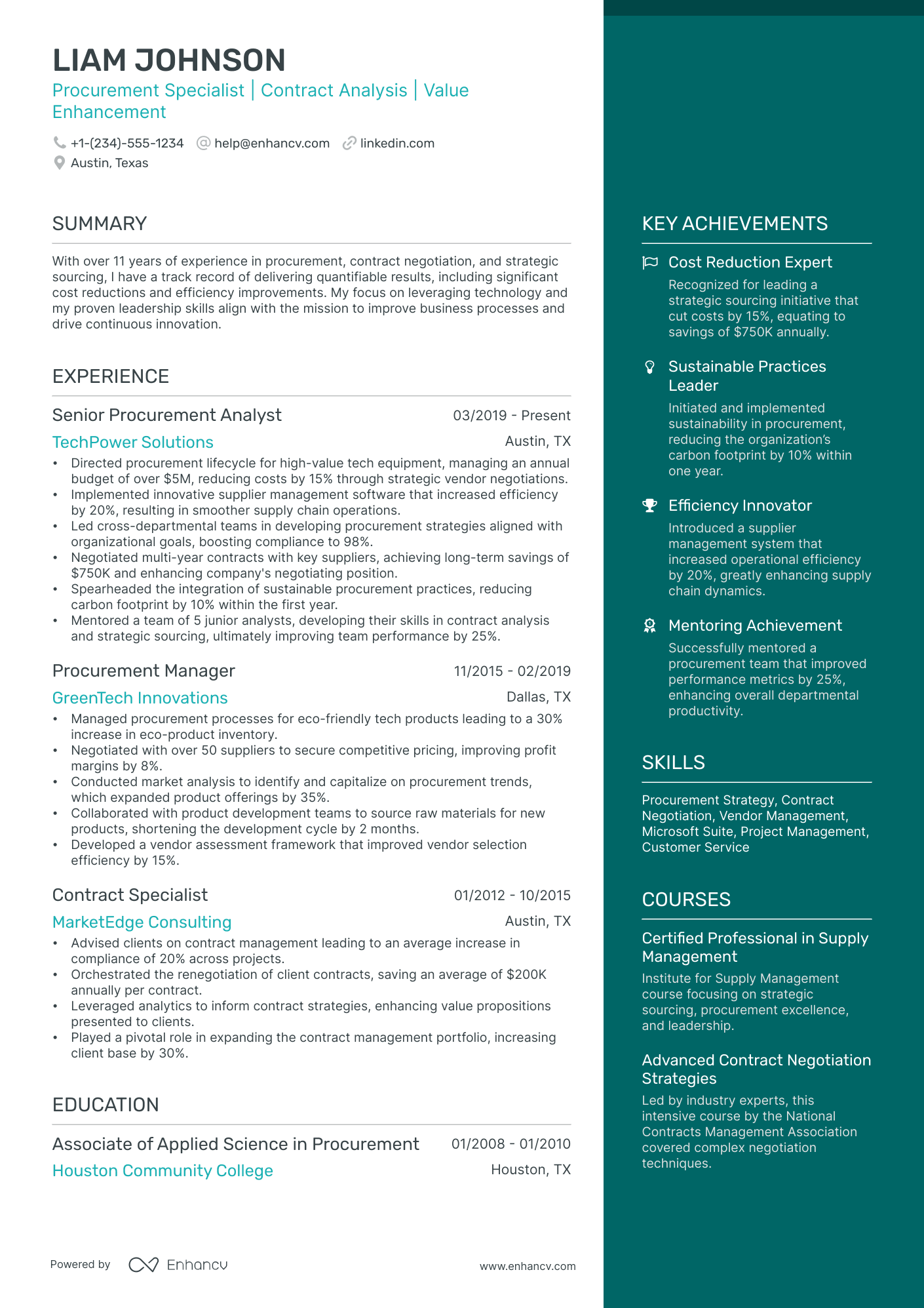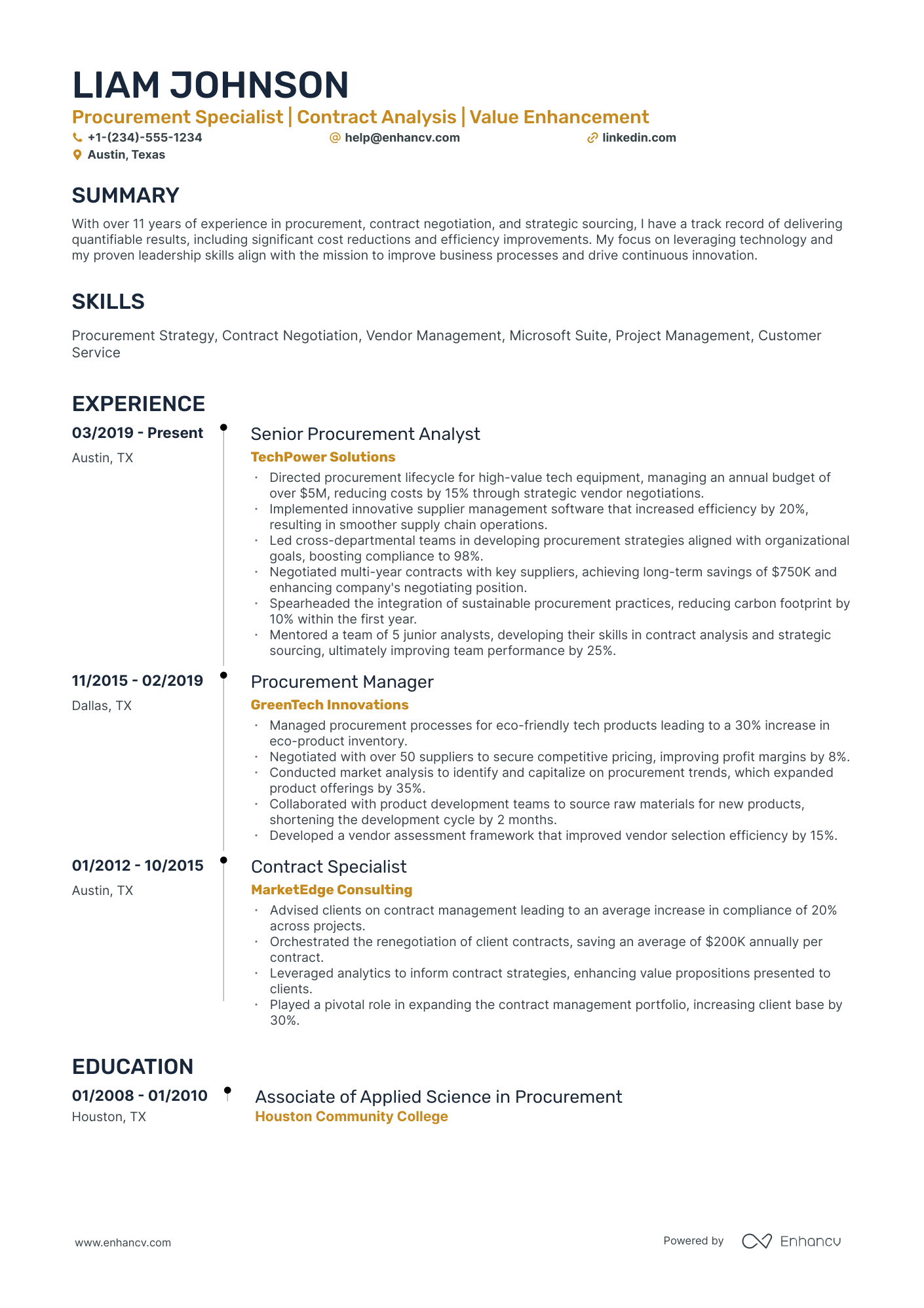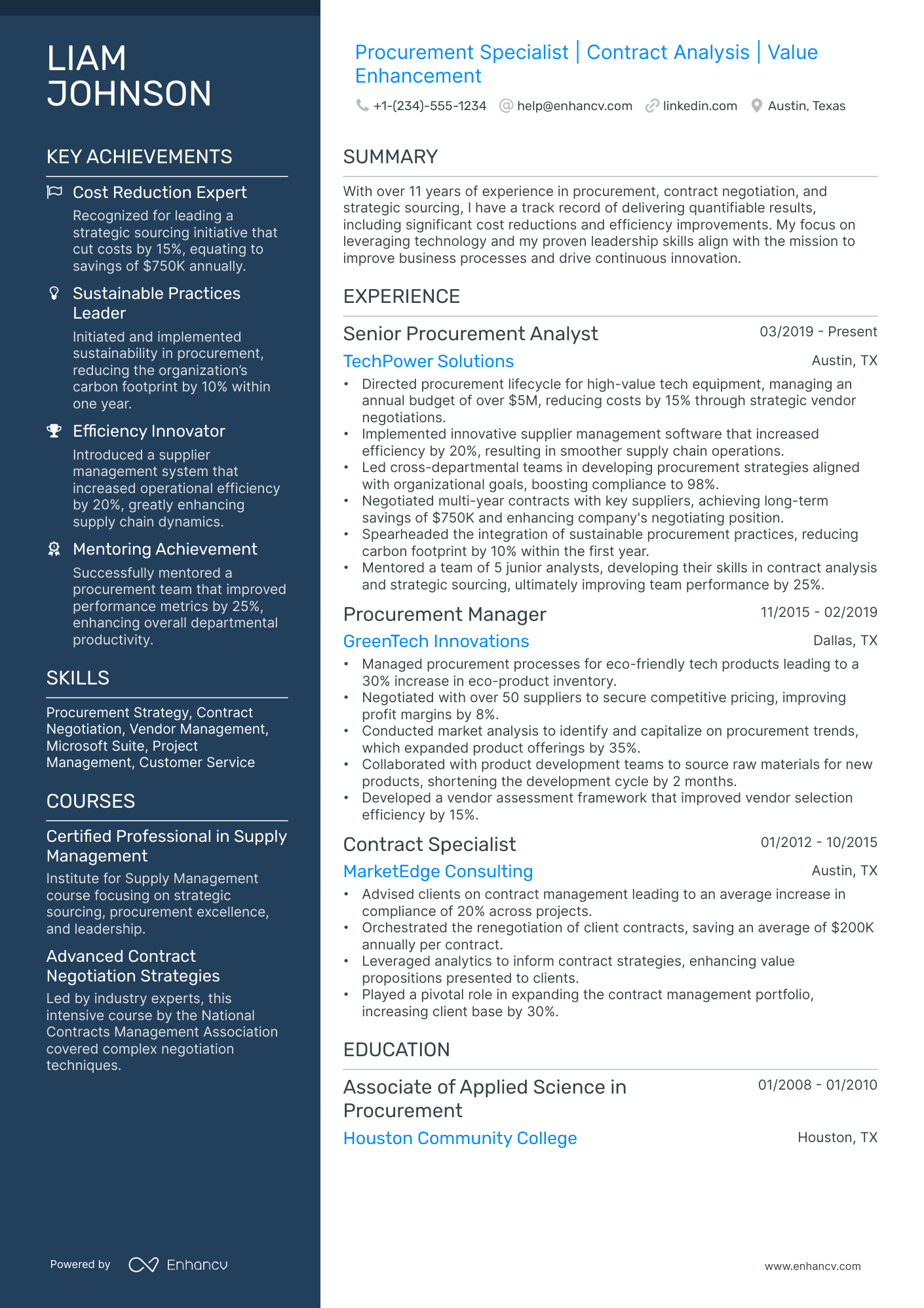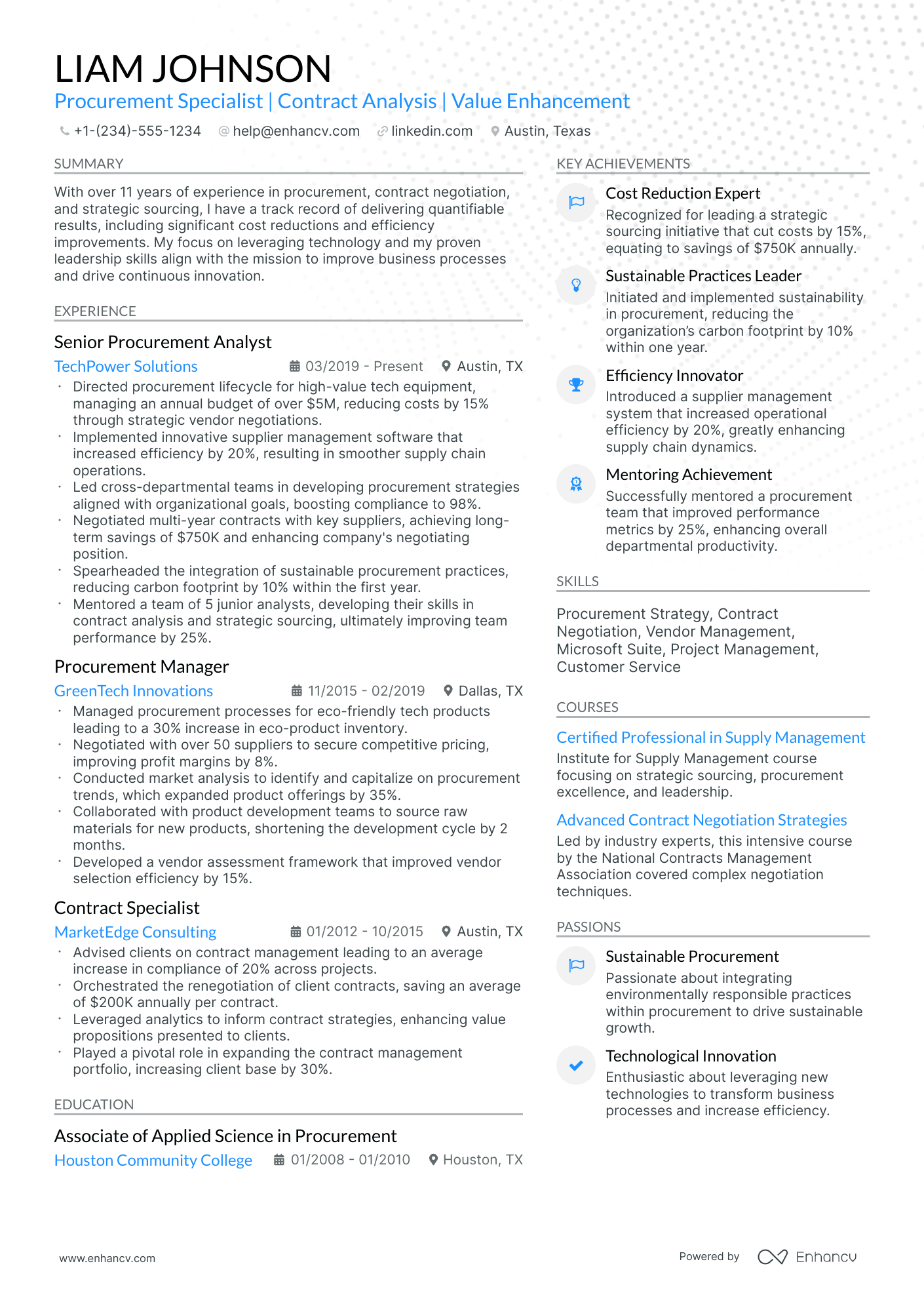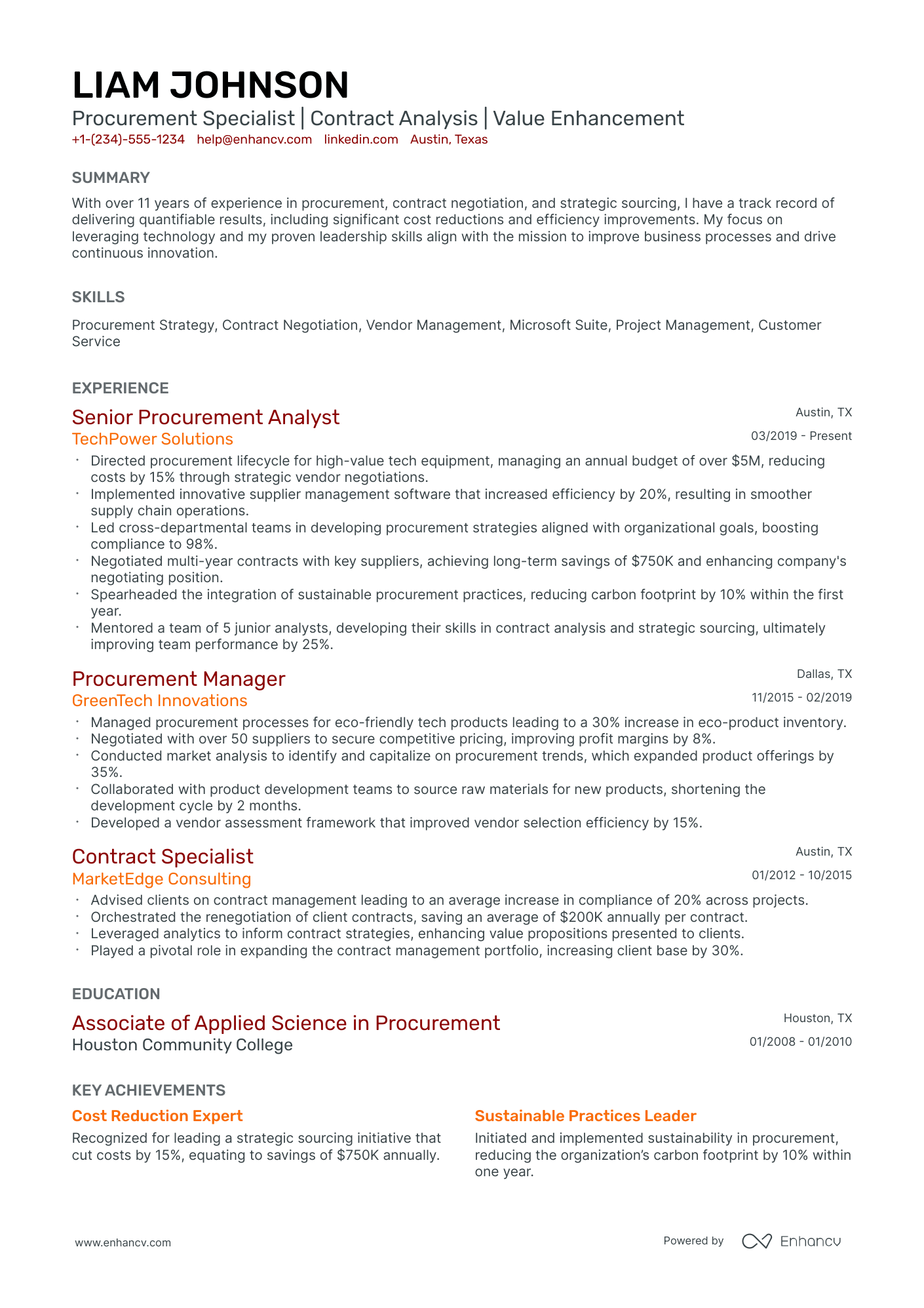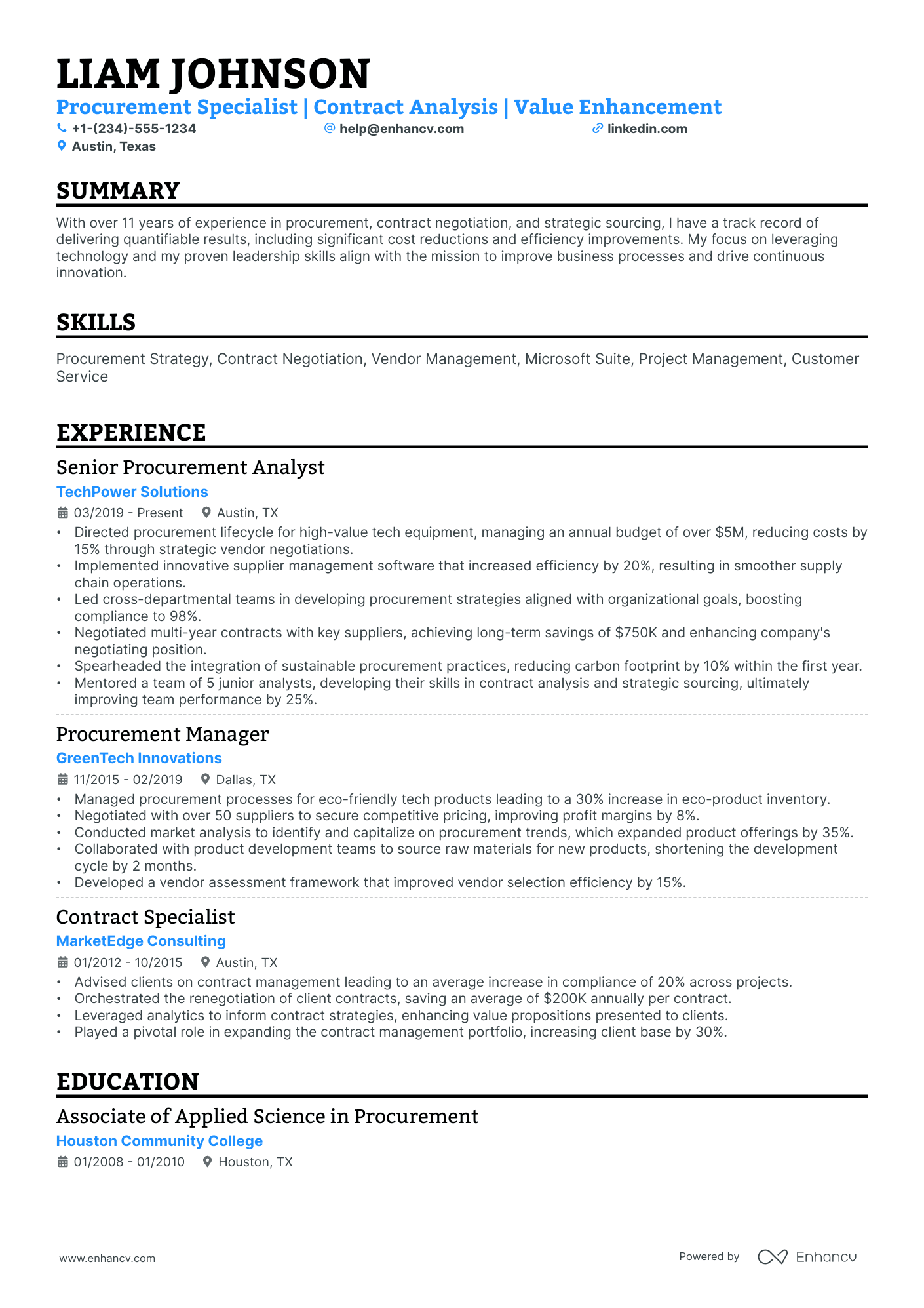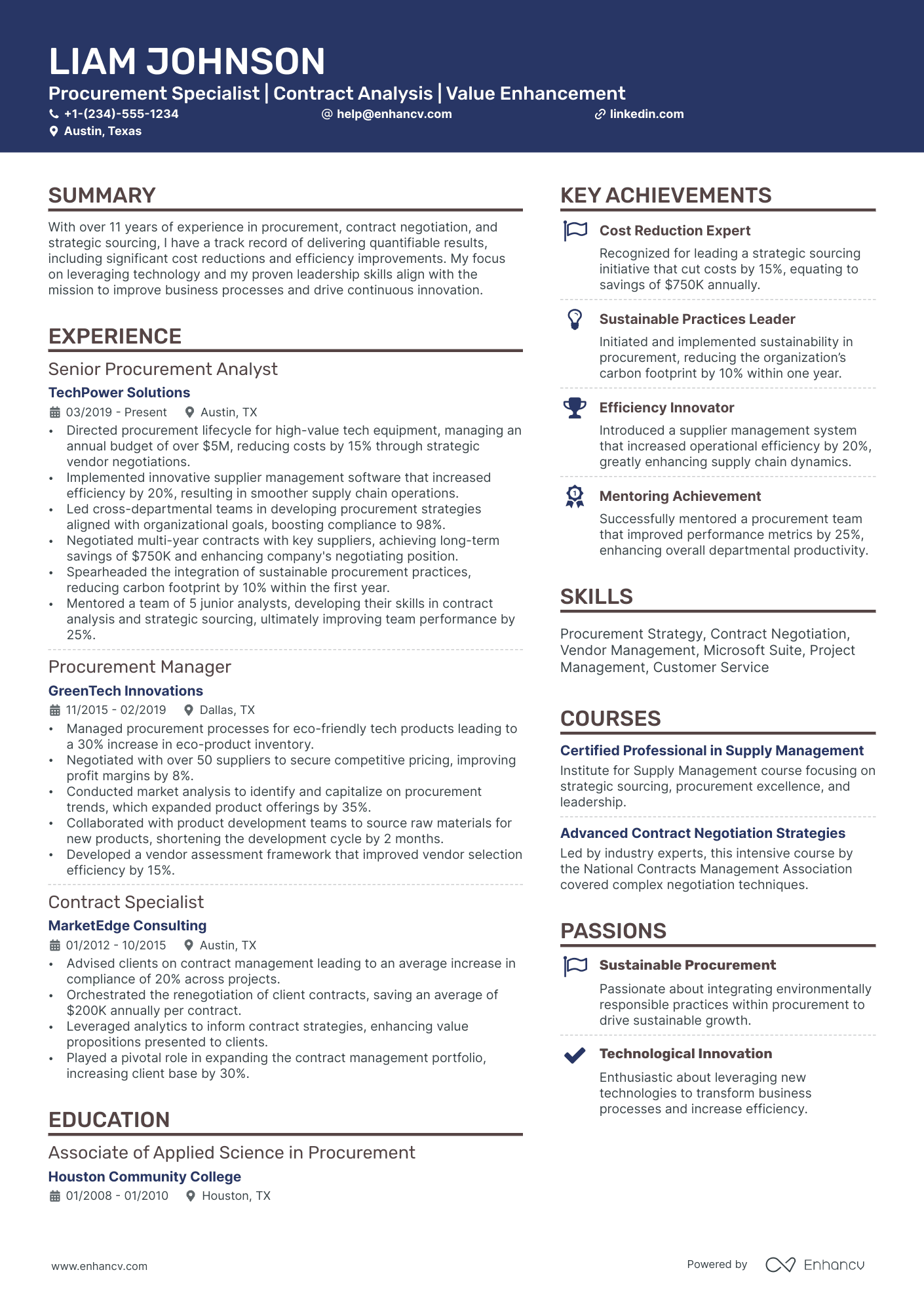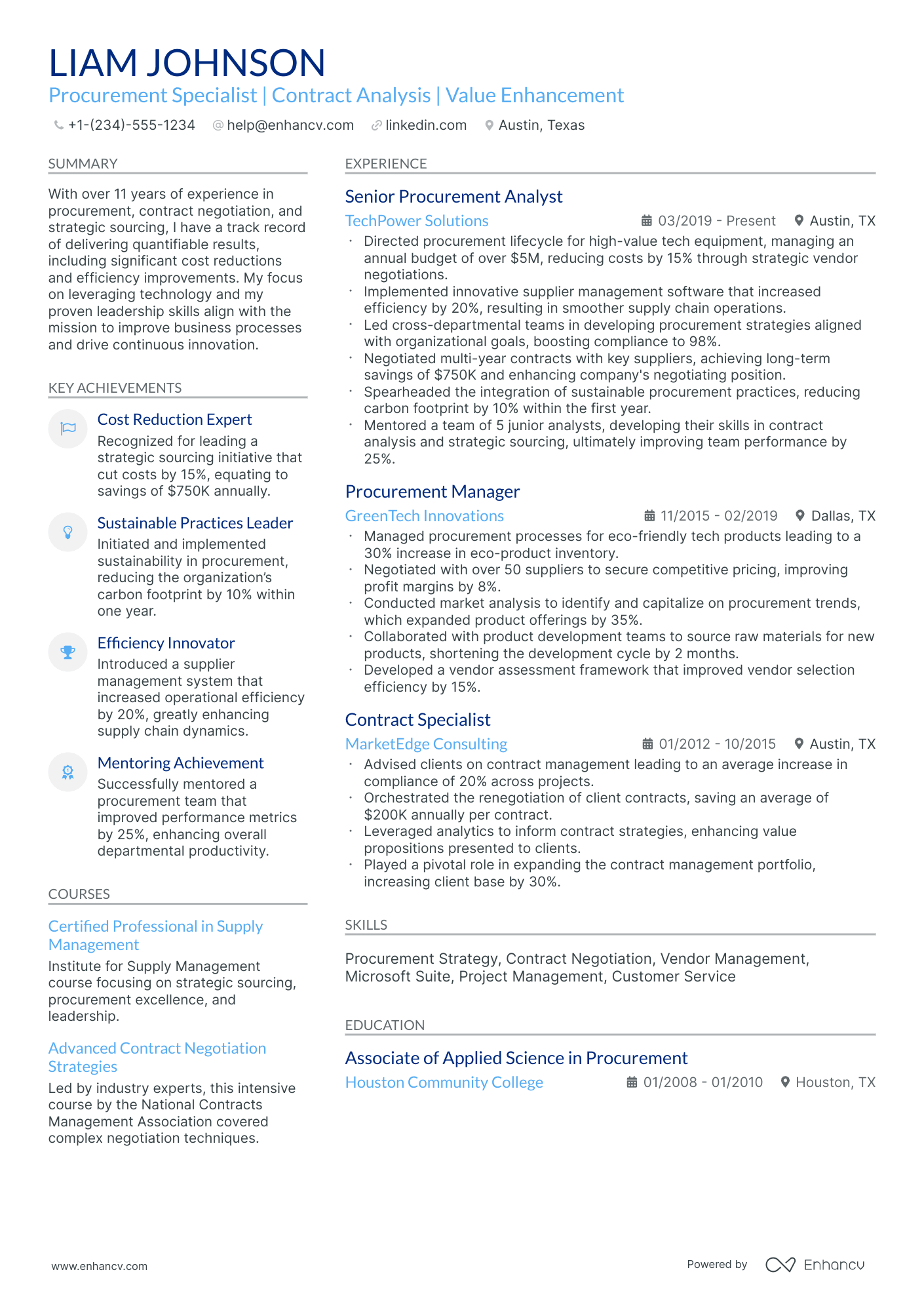As a contract analyst, you may struggle to showcase the breadth of your contractual assessment skills within the concise framework of a resume. Our guide provides expert strategies to help you articulate your analytical prowess and successfully convey your unique value to potential employers.
- Utilize real-life examples to refine your contract analyst resume;
- Effectively write the experience section of your contract analyst resume, even if you have minimal or no professional experience;
- Incorporate the industry's top 10 essential skills throughout your resume;
- Include your education and certifications to highlight your specific expertise.
If the contract analyst resume isn't the right one for you, take a look at other related guides we have:
- HR Director Resume Example
- People Manager Resume Example
- HR Program Manager Resume Example
- District Manager Resume Example
- Benefits Manager Resume Example
- Training Director Resume Example
- Knowledge Manager Resume Example
- Talent Manager Resume Example
- Benefits Analyst Resume Example
- Recruitment Manager Resume Example
Professional contract analyst resume format advice
Achieving the most suitable resume format can at times seem like a daunting task at hand.
Which elements are most important to recruiters?
In which format should you submit your resume?
How should you list your experience?
Unless specified otherwise, here's how to achieve a professional look and feel for your resume.
- Present your experience following the reverse-chronological resume format . It showcases your most recent jobs first and can help recruiters attain a quick glance at how your career has progressed.
- The header is the must-have element for your resume. Apart from your contact details, you could also include your portfolio and a headline, that reflects on your current role or a distinguishable achievement.
- Select relevant information to the role, that should encompass no more than two pages of your resume.
- Download your resume in PDF to ensure that its formatting stays intact.
Adjust your resume layout based on the market – Canadian resumes, for example, may follow a unique format.
Upload & Check Your Resume
Drop your resume here or choose a file. PDF & DOCX only. Max 2MB file size.
PRO TIP
Listing your relevant degrees or certificates on your contract analyst resume is a win-win situation. Not only does it hint at your technical capabilities in the industry, but an array of soft skills, like perseverance, adaptability, and motivation.
The five (plus) definite sections your resume for a contract analyst job should include are:
- Header with your headline, contact details, and/or a preview of your work
- Summary (or objective) to pinpoint how your success aligns with the role
- Experience with bullets of your most relevant achievements in the field
- Skills to integrate vital job requirements (both technical and personal)
- Your further dedication to the field, showcased via relevant higher education and/or certifications
What recruiters want to see on your resume:
- Demonstrated experience in contract review, drafting, and negotiation.
- Strong understanding of contract law and terms, with particular emphasis on the specific industry the company operates in.
- Proficiency in contract management software and other relevant IT systems.
- Detail-oriented with an ability to spot errors and inconsistencies in contracts.
- Excellent analytical and critical thinking skills to assess contract performance and compliance.
Advice for your contract analyst resume experience section - setting your application apart from other candidates
Your resume experience section needs to balance your tangible workplace achievements with job requirements.
The easiest way to sustain this balance between meeting candidate expectations, while standing out, is to:
- Select really impressive career highlights to detail under each experience and support those with your skills;
- Assess the job advert to define both the basic requirements (which you could answer with more junior roles) and the more advanced requirements - which could play a more prominent role through your experience section;
- Create a separate experience section, if you decide on listing irrelevant experience items. Always curate those via the people or technical skills you've attained that match the current job you're applying for;
- Don't list experience items from a decade ago - as they may no longer be relevant to the industry. That is, unless you're applying for a more senior role: where experience would go to demonstrate your character and ambitions;
- Define how your role has helped make the team, department, or company better. Support this with your skill set and the initial challenge you were able to solve.
Take a look at how real-life contract analyst professionals have presented their resume experience section - always aiming to demonstrate their success.
- Reviewed and negotiated over 150 complex service agreements with external vendors, improving contract terms and reducing risk exposure by 25% for the fiscal year 2021.
- Led a cross-departmental team to develop a comprehensive contract management system, increasing tracking efficiency by 40% and reducing processing time by 15 days on average.
- Implemented a strategic monthly reporting process that provided actionable insights into contract performance, directly supporting executive decision-making for budget allocations and operational improvements.
- Spearheaded the due diligence process for mergers and acquisitions, identifying key contractual obligations and enabling smooth post-merger integration for 5 acquired entities.
- Facilitated the renegotiation of vendor terms which culminated in an annual cost saving of approximately $3 million, enhancing the company's bottom line.
- Collaborated with legal and procurement teams to streamline the contract review process, cutting the average review cycle from 3 weeks to 10 days.
- Played a key role in the transition to a cloud-based contract repository, resulting in improved remote access for stakeholders and a 30% reduction in document retrieval time.
- Analyzed and managed over 200 vendor contracts per year, ensuring compliance with internal policies and external regulations, notably achieving zero non-compliance incidents in 2017.
- Presented quarterly contract performance reviews that informed leadership's strategic plans and contributed directly to an increase in supplier performance by 18%.
- Conducted comprehensive contract audits for a portfolio exceeding 500 active contracts, highlighting areas of risk and proposing mitigation strategies.
- Oversaw the implementation of compliance training for 100+ team members, which reduced contract breaches by 45% within the first year of rollout.
- Authored and maintained a contract playbook, which became the standard reference for negotiating terms, enhancing consistency and accuracy in contract execution.
- Provided subject matter expertise in the structuring of complex deals, influencing the terms of contracts amounting to over $50 million in potential revenue.
- Developed training materials and led workshops for new contract analysts, improving departmental knowledge and efficiency by 35% within six months of training completion.
- Played an instrumental role in enforcing contract data integrity across the organization, contributing to an enhanced audit readiness status and a 20% reduction in data-related discrepancies.
- Successfully negotiated terms of software license agreements saving the company an average of 22% in software costs annually.
- Designed and executed a modified contract negotiation strategy which became the template for future negotiations, ensuring a consistent approach and optimized results.
- Cultivated strong vendor relationships that allowed for more flexible terms and improved service levels in times of critical business need.
- Managed the analysis and revision of over 300 contracts annually, effectively reducing errors by 50% and safeguarding the company against contractual risks.
- Created a centralized database for contract version control that improved document retrieval times and reduced duplication efforts.
- Played a pivotal role in the contract renewal process, identifying opportunities for cost-saving and value-add in 90% of cases handled.
- Negotiated technology procurement contracts with key IT vendors, securing favorable terms and saving the company an estimated $2.5 million over two years.
- Leveraged data analytics to predict and address contract lifecycle bottlenecks, resulting in a 30% decrease in cycle time for contract execution.
- Instrumental in the successful rollout of a new contract management software platform that consolidated disparate systems, achieving a 20% increase in end-user satisfaction.
The following content includes information from "O*NET OnLine" by the U.S. Department of Labor, Employment and Training Administration (USDOL/ETA). Used under the CC BY 4.0 license. The data represents the top responsibilities present on the task lists for contract analyst professionals.
Top Responsibilities for Contract Analyst:
- Monitor and follow applicable laws and regulations.
- Prepare purchase orders, solicit bid proposals, and review requisitions for goods and services.
- Negotiate, renegotiate, and administer contracts with suppliers, vendors, and other representatives.
- Purchase the highest quality merchandise at the lowest possible price and in correct amounts.
- Analyze price proposals, financial reports, and other data and information to determine reasonable prices.
- Formulate policies and procedures for bid proposals and procurement of goods and services.
- Hire, train, or supervise purchasing clerks, buyers, and expediters.
- Maintain and review computerized or manual records of purchased items, costs, deliveries, product performance, and inventories.
- Research and evaluate suppliers, based on price, quality, selection, service, support, availability, reliability, production and distribution capabilities, and the supplier's reputation and history.
- Confer with staff, users, and vendors to discuss defective or unacceptable goods or services and determine corrective action.
Quantifying impact on your resume
- Analyze historical contract data to identify trends that contribute to operational improvements and include achieved results in percentage or dollar figures.
- Highlight your experience in negotiating contract terms by detailing the amount of money saved or revenue generated through your negotiation skills.
- Document the number of contracts you review on a weekly or monthly basis to demonstrate capacity and time management skills.
- Include the value of contracts you manage or oversee to show the scale of your experience and the trust placed in your judgement.
- Specify any process improvements you initiated, noting the subsequent reduction in time or resources required, quantified by percentages.
- Showcase your compliance work by indicating the percentage of contracts you realigned to adhere to new regulations or standards.
- Mention any automation tools or software you have implemented for contract management and quantify the efficiency gains achieved.
- Indicate the amount of risk mitigated by your contract analysis by using financial terms or projected cost avoidance figures.
Action verbs for your contract analyst resume
Four quick steps for candidates with no resume experience
Those with less or no relevant experience could also make a good impression on recruiters by:
- Taking the time to actually understand what matters most to the role and featuring this within key sections of their resume
- Investing resume space into defining what makes them a valuable candidate with transferrable skills and personality
- Using the resume objective to showcase their personal vision for growth within the company
- Heavily featuring their technical alignment with relevant certifications, education, and skills.
Remember that your resume is about aligning your profile to that of the ideal candidate.
The more prominently you can demonstrate how you answer job requirements, the more likely you'd be called in for an interview.
Recommended reads:
PRO TIP
If you happen to have some basic certificates, don't invest too much of your contract analyst resume real estate in them. Instead, list them within the skills section or as part of your relevant experience. This way you'd ensure you meet all job requirements while dedicating your certificates to only the most in-demand certification across the industry.
Popular contract analyst hard skills and soft skills for your resume
Apart from assessing your professional expertise, recruiters are on the lookout for whether your skills align with the job.
Your profile would thus be assessed in regard to your:
- Hard or technical skills - your ability to perform on the job using particular technologies or software
- Soft skills - how you adapt, communicate, and thrive in different environments.
Both types of skills - hard and soft skills - are important for your resume, so make sure to create a dedicated skills section that:
- Lists up to five or six skills that align with the job advert.
- Integrates vital keywords for the industry, but also reflects on your personal strengths.
- Builds up further your skills with an achievements section within which you explain what you've achieved thanks to using the particular skill.
- Aims to always quantify in some way how you've used the skill, as it's not enough to just list it.
What are the most sought out hard and soft skills for contract analyst roles?
Check out the industry's top choices with our two dedicated lists below:
Top skills for your contract analyst resume:
Contract Management Software
Microsoft Excel
Data Analysis Tools
Document Management Systems
Legal Research Software
e-Signature Platforms
Project Management Tools
Compliance Management Software
Database Management Systems
Financial Analysis Software
Attention to Detail
Analytical Thinking
Communication Skills
Negotiation Skills
Problem-Solving
Time Management
Team Collaboration
Adaptability
Critical Thinking
Organizational Skills
Next, you will find information on the top technologies for contract analyst professonals from "O*NET OnLine" by the U.S. Department of Labor, Employment and Training Administration (USDOL/ETA). Used under the CC BY 4.0 license.
Top technologies for Contract Analyst’s resume:
- Microsoft Dynamics
- Oracle PeopleSoft
- Google Docs
- Microsoft Word
- Microsoft Access
- Oracle Database
PRO TIP
The more time and effort you've put into obtaining the relevant certificate, the closer to the top it should be listed. This is especially important for more senior roles and if the company you're applying for is more forward-facing.
Maximizing your contract analyst resume: education and certification sections
To effectively showcase your industry knowledge in your contract analyst resume, it's important to properly list your education and certifications.
For the education section, ensure you include:
- Higher education degrees pertinent to the industry or those at a postgraduate level;
- The start and end dates of your education, along with the name of the institution you graduated from;
- Your GPA and relevant coursework, but only if they are impressive and applicable to the role.
Additionally, create a separate certifications section to spotlight your most notable recognitions. Another excellent place to feature a leading industry certificate is in your resume header, right after your name.
Below is a list of key industry certifications that are often sought after by recruiters
The top 5 certifications for your contract analyst resume:
- Contract and Commercial Management Certification (CCMC) - International Association for Contract & Commercial Management (IACCM)
- Contract Management Certificate (CMC) - National Contract Management Association (NCMA)
- Certified Commercial Contracts Manager (CCCM) - National Contract Management Association (NCMA)
- Project Management Professional (PMP) - Project Management Institute (PMI)
- Certified Professional Contract Manager (CPCM) - National Contract Management Association (NCMA)
The content below includes information from "O*NET OnLine" by the U.S. Department of Labor, Employment and Training Administration (USDOL/ETA). Used under the CC BY 4.0 license. The data represents the top associations for contract analyst professionals.
Top US associations for a Contract Analyst professional
- American Purchasing Society
- Association for Supply Chain Management
- Institute for Supply Management
- National Association of Educational Procurement
- National Association of State Procurement Officials
PRO TIP
If you're in the process of obtaining your certificate or degree, list the expected date you're supposed to graduate or be certified.
Recommended reads:
Deciding between a resume summary or objective for your contract analyst role
Understanding the distinction between a resume summary and an objective is crucial for your contract analyst resume.
A resume summary, typically three to five sentences long, offers a concise overview of your career. This is the place to showcase your most pertinent experience, key accomplishments, and skills. It's particularly well-suited for those with professional experience relevant to the job requirements.
In contrast, a resume objective focuses on how you can add value to potential employers. It addresses why they should hire you and outlines your career expectations and learning goals. Therefore, it's ideal for candidates with less experience.
In the following section of our guide, explore how resume summaries and objectives differ through some exemplary industry-specific examples.
Resume summaries for a contract analyst job
- With over 7 years of dedicated experience as a contract analyst in the tech industry, I have honed an expertise in contract negotiation, compliance, and risk management. Notably, I spearheaded the renegotiation process for a major client contract, resulting in a 20% increase in profitability for the firm.
- Accomplished financial professional making a strategic move into contract analysis with a strong foundation in accounting principles and due diligence investigations garnered over 10 years. My advanced analytical skills and meticulous attention to detail are assets for managing legal agreements and optimizing contractual outcomes.
- As an accomplished project manager for a leading construction firm with over a decade of experience, my skills in stakeholder coordination and cost control align perfectly with the meticulous nature of contract analysis. Seeking to leverage my project lifecycle expertise to excel in a new challenge within contract management.
- Enthusiastic about beginning a career in contract analysis with a strong personal commitment to learning and professional growth. Despite having no direct experience in this field, my academic background in business law and internships involving regulatory compliance have equipped me with a solid foundation to excel as a contract analyst.
- Meticulously analytical and detail-oriented, with a Bachelor’s degree in Business Administration and a strong internship experience in corporate legal departments. Eager to apply my knowledge of contract law and skills in document review to successfully support contract analysis and management processes.
- Proven expert in strategic sourcing and procurement with over 9 years of experience, I recently completed a contract law certification to pivot my career into contract analysis. My extensive background in vendor negotiations and supply chain management, combined with newly acquired legal proficiencies, position me uniquely for this career transition.
Optimize your resume summary and objective for ATS
Drop your resume here or choose a file.
PDF & DOCX only. Max 2MB file size.
Average salary info by state in the US for contract analyst professionals
Local salary info for Contract Analyst.” Source: My Next Move, National Center for O*NET Development. Accessed 10/15/2024
| State | Average Salary (in USD) |
|---|---|
| US National Average | $71,950 |
| California (CA) | $77,720 |
| Texas (TX) | $67,600 |
| Florida (FL) | $65,990 |
| New York (NY) | $76,170 |
| Pennsylvania (PA) | $67,040 |
| Illinois (IL) | $73,920 |
| Ohio (OH) | $66,100 |
| Georgia (GA) | $66,300 |
| North Carolina (NC) | $64,110 |
| Michigan (MI) | $72,590 |
More sections to ensure your contract analyst resume stands out
If you're looking for additional ways to ensure your contract analyst application gets noticed, then invest in supplementing your resume with extra sections, like:
These supplementary resume sections show your technical aptitude (with particular technologies and software) and your people skills (gained even outside of work).
Key takeaways
- Impactful contract analyst resumes have an easy-to-read format that tells your career narrative with highlights;
- Select a resume summary or objective, depending on what sort of impression you'd like to leave and if your accomplishments are relevant to the job;
- If you don't happen to have much industry expertise, curate additional gigs you've had, like contracts and internships, to answer how your experience aligns with the contract analyst job;
- Be specific about the hard and soft skills you list on your resume to define your niche expertise and outcomes of using those particular skills;
- Always tailor your resume for each contract analyst application to ensure you meet all job requirements.
